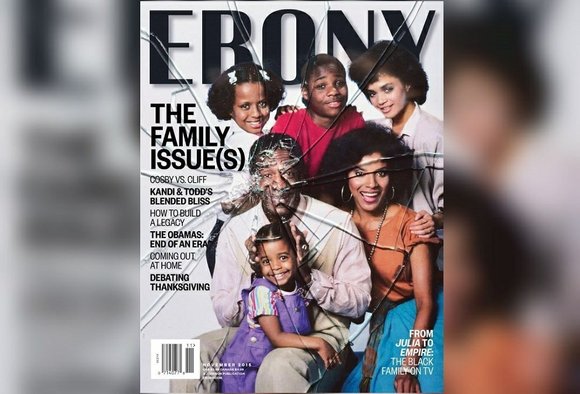(CNN) — There was a time when it was de rigueur for black American households to have a subscription to Ebony magazine. Its pages were one of the only places in media where black families could see their faces, lives and interests reflected back at them.
And then came “The Cosby Show,” the holy grail of media portrayals of African-American family life.
That’s what makes the November cover of Ebony, which features an early portrait of Bill Cosby’s TV family overlaid by shattered glass, so powerful and such a lightning rod for conversations within the community about Cosby’s legacy.
Dozens of allegations of sexual misconduct against Cosby, denied vigorously by attorneys for the entertainer, have tarnished his reputation as a family man, and may have also erased his show’s influence over not only African-Americans, but all Americans.
“If Bill Cosby is finished, what does that mean for Cliff, and the rest of the tribe called Huxtable?” asks writer Goldie Taylor in the cover story. The piece, which is excerpted online, explores the show’s essential role in African-American life, particularly as a counterpoint to black stereotypes, when it debuted in 1984.
The edition’s title, “The Family Issue(s),” nods at the magazine’s decision to air the black community’s dirty laundry. The image seems to signal that the dream is over — black or not, Cosby’s formerly adoring public can no longer look to him or his show for guidance and aspiration. But that’s just one interpretation.
Ebony editor in chief Kierna Mayo and her staff deliberately set out to spark the heated conversation happening online about the cover. Mayo told CNN’s Brooke Baldwin on Friday that she hadn’t slept in two days due to the emotional choice.
“When you understand the soul of black America and you understand how important iconography is and you understand how important the image of black family perfection … is, you realize that there’s no way to do something like this without it being hugely conversational, if not confrontational, and in many cases painful for people,” Mayo said.
Mayo said the cover isn’t an attempt to convict the entertainer in the court of black opinion.
“We are simply asking African-Americans to have a very passionate, a very honest and a very forthright conversation about what this means.”
Some Ebony readers are furious that the magazine is conflating Cosby’s personal life with his beloved on-air persona. Many argue that the image convicts a man who’s never been prosecuted for any of the alleged sexual assaults. Others criticize Ebony for being a black media outlet participating in tearing down a powerful black man.
“This is the lowest I’ve ever seen Ebony go! Wow! You would think Ebony, a Black magazine would be supportive! Smh…,” wrote a commenter on Ebony’s Facebook page. “‘Dr. Huxtable’ didn’t do a thing! The other part of the family shouldn’t have to suffer!”
“Shame on you ‘Ebony,'” wrote another reader. “This cover is a disrespect to yourselves, your readers, and the beautiful image of the fictional Cosby family. Magazines articles are to uplift, not desecrate.”
Some comments were more measured.
“Well the cover is provocative; but it would have been more tasteful to place a picture like this with Cosby by himself or a juxtaposition of Cosby vs Dr. Huxtable. The Huxtable family means a lot to Black America fictional or not.
Cosby personably lost me years ago with that pull up your pants mess; but the show still has meaning.”
Others are applauding the cover and the conversation meant to accompany it.
“This cover is perfect,” wrote one observer. “You know why? Because it forces us to address issues that take place behind the curtains of a picture perfect family.”
“Has anyone actually read the article yet?” asked a commenter on Ebony’s Facebook page. “It’s human nature to get riled up, but WE as a collective people need to be more objective, especially before jumping to emotional conclusions. It’s pretty obvious that this cover is being used to spark thought provoking discourse. Something that is much needed and lacking our community today…”
It remains to be seen whether the black community at large is willing to separate Cosby’s present circumstances from his life’s work. But the honors bestowed upon the once beloved entertainer can be taken away, and they are.
Several institutions of higher education, including three more this week, revoked honorary degrees granted to Cosby, according to media reports. Pennsylvania’s Lehigh University rescinded its honor on Wednesday, while Tufts University in Massachusetts and Goucher College in Maryland revoked their honors on Thursday.
And the lawsuits continue.
Renita Hill, a Pennsylvania woman who once appeared with Cosby on a children’s television show in the 1980s when she was a teen, filed a lawsuit against him for defamation over his team’s denials of her claims, according to the Los Angeles Times.
Malcolm-Jamal Warner, who played Cosby’s son Theo on the show, worried about the impact of the scandal on the show’s legacy during an appearance on “The View” with “Cosby” co-star Raven-Symone.
“When we’ve had images that perpetuate the negative stereotype of people of color we’ve always had “The Cosby Show” to hold up against that,” Warner said. “The fact that we no longer have that kind of leaves us not in a great place in terms of having the wide scope of images of people of color.”
Yet the show still had a significant impact than can’t be denied, he said.
“That’s a show that we’re all very proud to have been on,” he said. “And (former Cosby co-star) Keisha Pulliam said an interesting thing. Her perspective is the legacy cannot be taken away because all of the good that that show has done cannot be taken away. The generation of people of color who have chosen to go to college because of that show. You can’t take that away.”
The-CNN-Wire
™ & © 2015 Cable News Network, Inc., a Time Warner Company. All rights reserved
